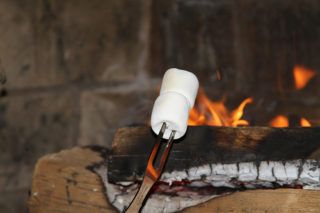
What do you plan to do when you win The Marshmallow Challenge?Photo by: Jim, the Photographer
Two or more kids compete, head-to-head, sitting across a table from each other, each being stared down by his own treat, to see who can delay gratification for fifteen minutes.
This is a public and sporting-event-like contest, and every Challenger plus the game’s Dutch Uncle can be PEAKed. Fifteen minutes is a long time, so younger kids might play for shorter durations, and other activities can be going on to keep things from getting boring.
I like very small cookies as the treat, rather than marshmallows, but miniatures can work, too. In any case, a little sugar in a Toddler goes a long way.
The game scores like this:
If there are zero successful Challengers, each gets his own treat, by default, at the time of his opting out of the game.
If there are one or more successful Challengers, those who succeed get a second treat as their reward for delaying their gratification.
If all Challengers are successful, each gets the second treat, and each of the PEAK evaluators gets a treat, too, for being a part of such an awesome experience. Why? Say this as a chant: “When everyone wins – EVERYONE wins!”
A note about orientation: C/I education makes rivals, D/S education makes friends.
What the original marshmallow experiment actually measures is the quality of a child’s upbringing – the consistent, habituated expectations his parents have for him from birth. Highly Cautious and Driven parents raise children who are well-practiced in delay-gratification. Incandescent and Sociable parents less so. The Marshmallow Challenge evens up the odds by giving all children regular practice weighing the costs and benefits of delaying rewards.
The kids who are already Driven or Cautious probably won’t improve much – although they will love playing – but the Sociables, in particular, will show huge gains in very short order.
Endurance, patience, tolerance, forbearance – these are not innate qualities but learned virtues. The Marshmallow Challenge – either this formal game or its informal real-life parallels – is how children learn those qualities of character.
Big duh, yeah? Big things are made of little things – and teaching little people big ideas will yield big results in due course.















